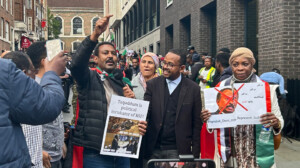Pregnant tea seller killed as ‘drunken soldier’ sparks Khartoum firefight
A pregnant tea seller has died, and others were wounded by stray bullets in fighting that erupted between government troops in Nile Street in Khartoum on Wednesday afternoon. The Transitional Military Council (TMC) say the incident was sparked by ‘a drunken soldier’.
 Cartoon depicting Majda John, a pregnant tea vendor killed in an exchange of fire between soldiers on Nile Street in Khartoum yesterday (By Tibyan Albasha)
Cartoon depicting Majda John, a pregnant tea vendor killed in an exchange of fire between soldiers on Nile Street in Khartoum yesterday (By Tibyan Albasha)
A pregnant tea seller has died, and others were wounded by stray bullets in fighting that erupted between government troops in Nile Street in Khartoum on Wednesday afternoon. The Transitional Military Council (TMC) say the incident was sparked by ‘a drunken soldier’.
In a press statement on Wednesday via the official Sudan News Agency (SUNA), the TMC acknowledged the death of the woman named as Majda John in the shooting incident on Nile Street, which it termed “the result of a fight between members of the armed forces and citizens, when a member of the Defence Services Brigade, who was in a state of drunkenness, opened fire.”
The statement confirmed similar reports by the Sudan Doctors Central Committee that a civilian was shot in the leg, and a soldier was hit by a stick on the leg.
The TMC say that “the situation was contained, the culprit was arrested, the injured person was hospitalised, while the body of Mayda John was transferred to the mortuary.
Reports on social media identify the woman as one of the hundreds of tea sellers* who routinely ply their trade along Nile Street.
The TMC stressed that “the incident was an individual and isolated one,” adding that all the legal and other measures to preserve security to protect citizens will be taken.
The TMC said the suspected soldier was arrested and he would face justice.
“The armed forces confirm that this is an individual and isolated incident and will take legal action and the necessary measures to maintain security and protect citizens,” stressed the statement.
Sudanese Professionals Association
However, in a separate statement on Wednesday, the Sudanese Professionals Association (SPA) strongly condemned the violence near the sit-in in front of the General Command of the Sudanese army in down-town Khartoum. The SPA described the firefight as “irresponsible childish behaviour of the regular forces” and demanded that those involved be brought to justice.
The SPA called on the protesters at the sit-in “to restrain themselves, adhere to the sit-in area map, and stop giving opportunities to those targeting protesters”, after angry demonstrators torched an army tent on Nile Street, and partially closed the avenue before opening it again and allowing vehicles to pass.
West Darfur
A number of protesters at Um Tajok in Kireinik in West Darfur were injured, some of them seriously, in an attack by adherents of the former regime on Wednesday?.
Witnesses told Radio Dabanga the incident occurred after a large crowd of protesters arrived at the sit-in in front of the army command at Um Tajok in solidarity with the general strike in the country declared by the Alliance of Freedom and Change (AFC).
Witnesses said a well-known group of supporters of the former regime and shadow battalions assaulted the protesters with sticks and knives, injuring ten people, some of them seriously who were taken to Kireinik Hospital.
* Tea sellers:
There are more than 8,000 women engaged in selling tea and food in Sudan, according to an inventory conducted in 2015.
Awadiya Mahmoud, founder and head of the Women’s Food and Tea Sellers’ Cooperative, told Radio Dabanga in a previous interview: “The women are in desperate need to practice their trade, especially in light of the deterioration of living conditions that forces them to sell tea in the markets and streets.”
In July 2016, the Khartoum state Commissioner issued a decision to withdraw the permits of vendors to sell tea along Nile Street, the boulevard that follows the Blue Nile, without the provision of alternatives for the women sellers to carry on their businesses close to shopping areas.
Study
A study by economic expert Dr Hasan Abdelati found that 88.6 per cent of the tea sellers in Khartoum are either displaced or migrants from rural areas.
In the study, Dr Abdelati asserts that the tea sellers’ sector is growing because of inflation, war, difficult economic conditions, illiteracy, and poor education standards among the women.
Our editorial independence means that we can continue to provide factual updates about ongoing protests to Sudanese and international actors, educate people about how to avoid outbreaks of infectious diseases, and provide a window to the world for those in all corners of Sudan. Support Radio Dabanga for as little as €2.50, the equivalent of a cup of coffee.












 and then
and then